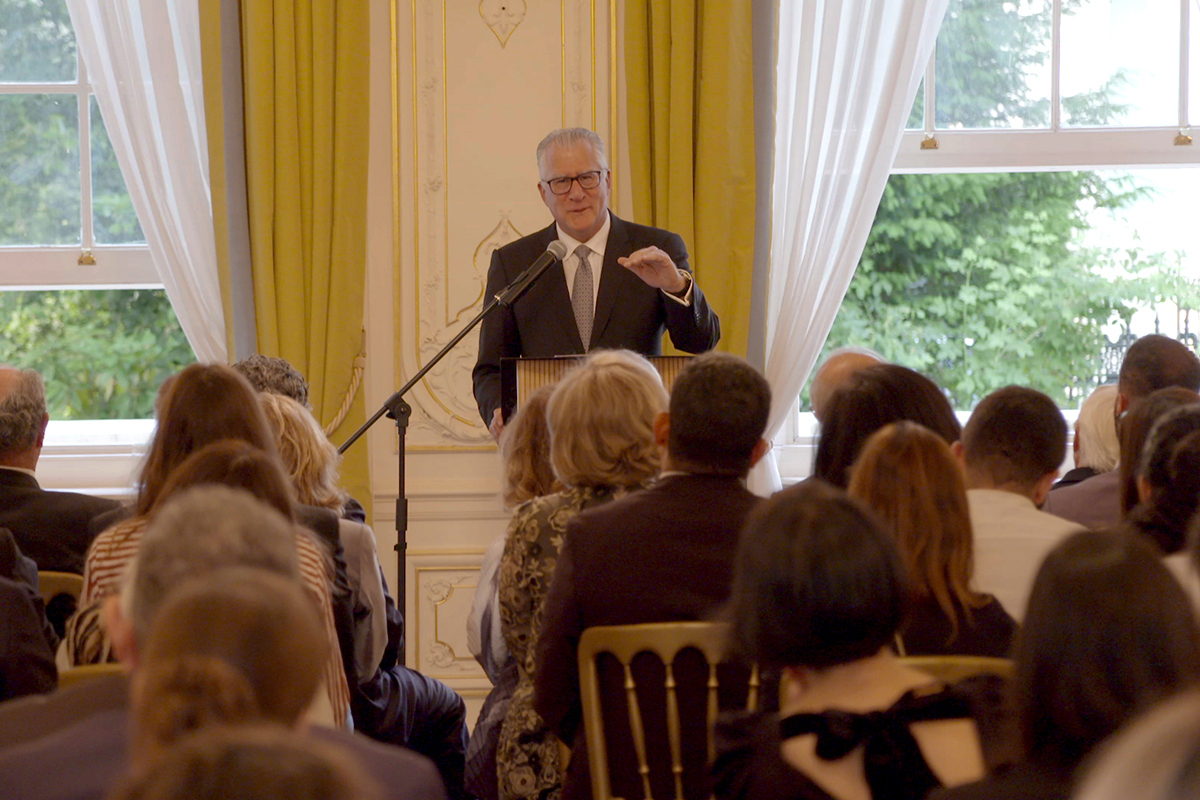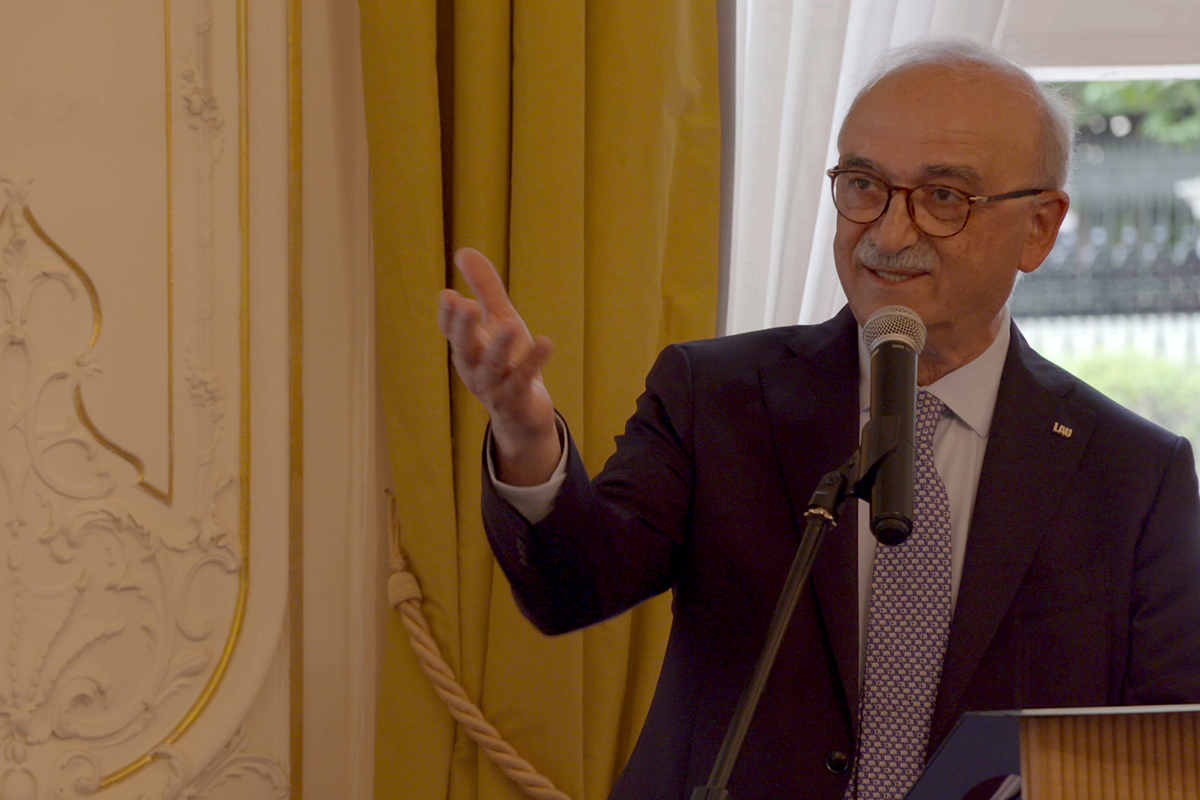Harnessing the Power of AI in Medical Education
LAU trustee and member of the Board of Directors at Moderna, Dr. François Nader, shares his experience in biopharma and advocates for AI in medical research.
On 20 June, the Ambassador of Lebanon to the United Kingdom Rami Mortada and the LAU Alumni Chapter in London hosted a talk by member of the Moderna Board of Directors and LAU trustee François Nader on Al and Medical Research in Action: From the COVID Vaccine to Treating Cancer to …?
Having served on the COVID Vaccine Development committee at Moderna, Dr. Nader was involved in the fight against the pandemic of the century. As the race was on to develop a vaccine – the ultimate defense against a virus of which little was known – what helped to expedite the process at the pharmaceutical and biotechnology company was the availability of the technology – messenger RNA – which had been 10 years in the making.
The development of vaccines in record time encapsulates the prerequisites for discovery: research, technology, anticipation and inquiring minds, skills that should be fostered in education.
The thirst for knowledge, said Dr. Nader, served him best in his long career in biotech. “This is something that has driven me all my life. Because biotech is a new science, you deal with newness every day, be it with products, drugs and so on that will be on the market 10, 15, or 20 years from now,” he said.
“So it’s really having the openness to learn and question what you know because with science moving forward, it can at times reverse your common knowledge, and you have to adapt to a new reality,” he said.
As an LAU trustee, Dr. Nader is working with the board and the administration on enriching education with research, specifically human research, and integrating Artificial Intelligence into the medical curriculum.
“AI is what our students today will have to use as practitioners tomorrow and it will be part of their armamentarium, as important as their stethoscope,” he said.
AI plays a role in healthcare in different ways, among which are drug discovery and delivery, said Dr. Nader. It can potentially replace, reduce or eliminate administrative tasks in the medical system at all levels. Most importantly, it can contribute to decreasing the cost of developing new drugs, as it shortens discovery time as well as the clinical time, which becomes more targeted. The ability to target patients in need of a given drug cuts waste, thus saving the system substantial resources.
LAU is already leveraging AI and emerging technologies to enhance its students’ educational experience and equip them with the necessary skills to thrive in an AI-driven world.
Curricula are being fundamentally changed and adapted to prepare students to face the future and the forces of the market, noted LAU President Michel E. Mawad. “AI is already part and parcel of the education of our students, especially in imaging, oncology, stroke and cancer treatment, and cancer diagnosis,” he said.
“Medical students are learning to use the imaging algorithm to their best advantage. We are preparing them to become fluent with the technology in research, daily diagnostic studies, oncology and designing the drugs into personalized medicines for the treatment of individual cancers in individual patients,” he added.
Improving pedagogy through technology is one of LAU’s many strategic initiatives that aim to maintain and improve the university’s educational standard in a rapidly evolving environment for higher education, said Chairman of the LAU Board of Trustees Philip Stoltzfus. Another is extending its academic mission internationally in the MENA region and through a New York campus, to create an international network for its students.
“Higher education in Lebanon is at a critical impasse,” he said. “Its success or failure depends on us, the people who run the university, the administration, the board, the faculty and the alumni. We need to work together to make sure that the alumni can provide our students with opportunities and work with our departments in terms of international collaborations, internships and so on that will benefit the university as a whole.”
To maintain this crucial connection with the alumni, Mr. Stoltzfus has asked board members to adopt their local chapters, update them about the activities at the university, create joint events, and encourage them to support their alma mater.
Remarking on the LAU London Alumni Chapter’s contribution to fostering connections and opportunities for Lebanese professionals in the UK, Ambassador Mortada said: “The LAU chapter is a pool of skills and excellence that brings together members from different walks of life, all benefiting from this top-notch institution. The London Chapter, like the others, are great ambassadors.”
Co-leaders of the chapter, Dr. Shereen Nabhani (PharmD ’01) and Mr. Karim Boulos (BE ’06) expressed their delight with the turnout at the talk.
“This was a very successful event as evidenced by the high level of engagement from the Lebanese community,” said Dr. Nahbani, “and it is the first of hopefully many to come as our strategy is to position our London chapter as a hub for culture, art and science that brings people together.”
Dr. Nader, remarked Mr. Boulos, “captivated the Lebanese community in London with his inspirational talk, leaving a profound impact and significantly elevating the standard of future cultural events organized by the LAU Alumni London Chapter.”

